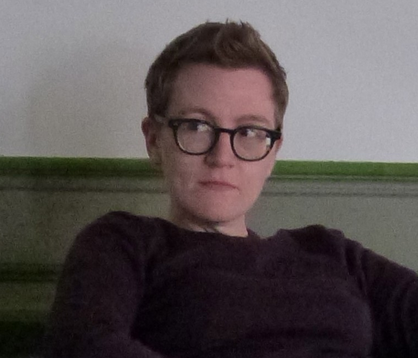By Amy Tooth Murphy
 My partner and I had a Civil Partnership this summer. We stood up in front of friends and family and made vows to each other, exchanged rings, had a Celtic handfasting, and signed on the dotted line to declare that we are joined in law as well as in spirit. Afterwards we ate, drank and danced with those closest to us, all coming together to celebrate our relationship. We were able to do so because of the Civil Partnership Act 2004, which extends legal rights to same-sex couples, almost identical to those enjoyed by married mixed-sex couples. Such legal protections and rights were unimaginable to me as a teenager coming out in my home town in the early 1990s, when Section 28 still prevented ‘the teaching in any maintained school of the acceptability of homosexuality as a pretended family relationship’.
My partner and I had a Civil Partnership this summer. We stood up in front of friends and family and made vows to each other, exchanged rings, had a Celtic handfasting, and signed on the dotted line to declare that we are joined in law as well as in spirit. Afterwards we ate, drank and danced with those closest to us, all coming together to celebrate our relationship. We were able to do so because of the Civil Partnership Act 2004, which extends legal rights to same-sex couples, almost identical to those enjoyed by married mixed-sex couples. Such legal protections and rights were unimaginable to me as a teenager coming out in my home town in the early 1990s, when Section 28 still prevented ‘the teaching in any maintained school of the acceptability of homosexuality as a pretended family relationship’.
In recent years Scotland has undergone a seismic shift in terms of legislation, as well as in cultural attitudes relating to LGBT (lesbian, gay, bisexual, transgender) people. Having lagged behind England, Scotland only finally decriminalised sex between men in 1980 (1967 in England). It is entirely feasible that there are male couples in Scotland now in their 50s and in recognised Civil Partnerships who were previously arrested for those same relationships in their teens and early twenties.
My partner and I are currently planning our ‘honeymoon’, and again, because of the Civil Partnership Act, together with the Equality Act (Sexual Orientation) Regulations 2007 (which made it unlawful to ‘discriminate on the grounds of sexual orientation in the provision of goods, facilities, and services’) we are able to book up with a travel company offering perks and upgrades on far-flung shores for ‘newlyweds’. In planning our ideal trip we’re asking typical holiday-maker questions like, ‘Where are the whitest sands and bluest seas?’, ‘Where can I drink a cocktail out of a coconut shell?’, and ‘Where is it not illegal to be gay?’. Okay, that last one is probably not on most honeymooners minds. But it should be. Despite the protections now thankfully afforded to us in this country, planning a trip to far-flung places still leaves us with potentially treacherous waters to navigate. Although the media has highlighted appalling LGBT rights issues in African and Middle Eastern countries of late, this leaves out huge patches of the globe still suffering from brutal anti-LGBT legislation. Trying to explain this to the first travel agent we spoke to proved difficult:
‘How about Antigua’?
‘Nope, that carries a 15 year jail sentence’,
‘Oh, how about Barbados? It’s lovely’
‘Nope, that would be life imprisonment. Although I’ve read it’s not enforced. Probably not worth the risk though’.
‘Okay, let’s try Asia. The Maldives is very popular.’
‘I’m sure it is. Unfortunately Shariah law allows for whippings, house arrest, deportation, 6 years in jail, or even death. Vigilante attacks and executions are relatively common place.’
‘Malaysia…?’
‘Well it’s legal for women but for men it’s 2-20 years imprisonment and whippings, so I think gay solidarity rules that one out.’
People have pointed out to us that if you’re paying enough money, and you’re closed up in your resort, then us Westerners don’t have to worry about these things. But that’s hardly the point.
So we’ve settled on Vietnam, which has never had any laws against homosexuality. Same-sex relationships are not recognised by law and same-sex marriage is not permitted, but at least we’re not supporting the imprisonment of gay and bisexual people, a human rights abuse that we have only very recently emerged from here in Scotland. It remains to be seen what kind of reception we will get when we turn up to our hotel to book into a double room.
Unfortunately, however, despite all the legal changes and cultural shift, this is a reality which LGBT people in Scotland and the UK still face. In 2008, Cornish B&B owners Hazelmary and Peter Bull refused civil partners Steven Preddy and Martyn Hall a double room. In 2010 the same thing happened to Michael Black and John Morgan at a B&B in Berkshire. Both couples eventually won their discrimination cases and were awarded compensation. Ethically and socially responsible holidaymaking may not sound like everyone’s idea of switching off and chilling out, but it’s vital that both LGBT and non-LGBT people show solidarity and conscience in spending their hard-earned holiday money, so that we can keep chipping away at the homophobia, biphobia and transphobia that perpetuate both at home and abroad.
Amy Tooth Murphy is an oral historian and historian of sexualities. She has recently joined the English and Creative Writing department at the University of Roehampton as Research Associate on Memories of Fiction: An Oral History, which will look at the role literature plays in our lives and life narratives. She is also co-editor of Notches: (re)marks on the history of sexuality. This is reprinted from Women’s History Scotland with permission. Photo source: Notches Blog
This is part 5 in a short blog series about LGBTQ histories and experiences in different countries. Read the series introduction, Part 2: Singapore, Part 3: Mexico and Part 4: The Netherlands.
Add new comment